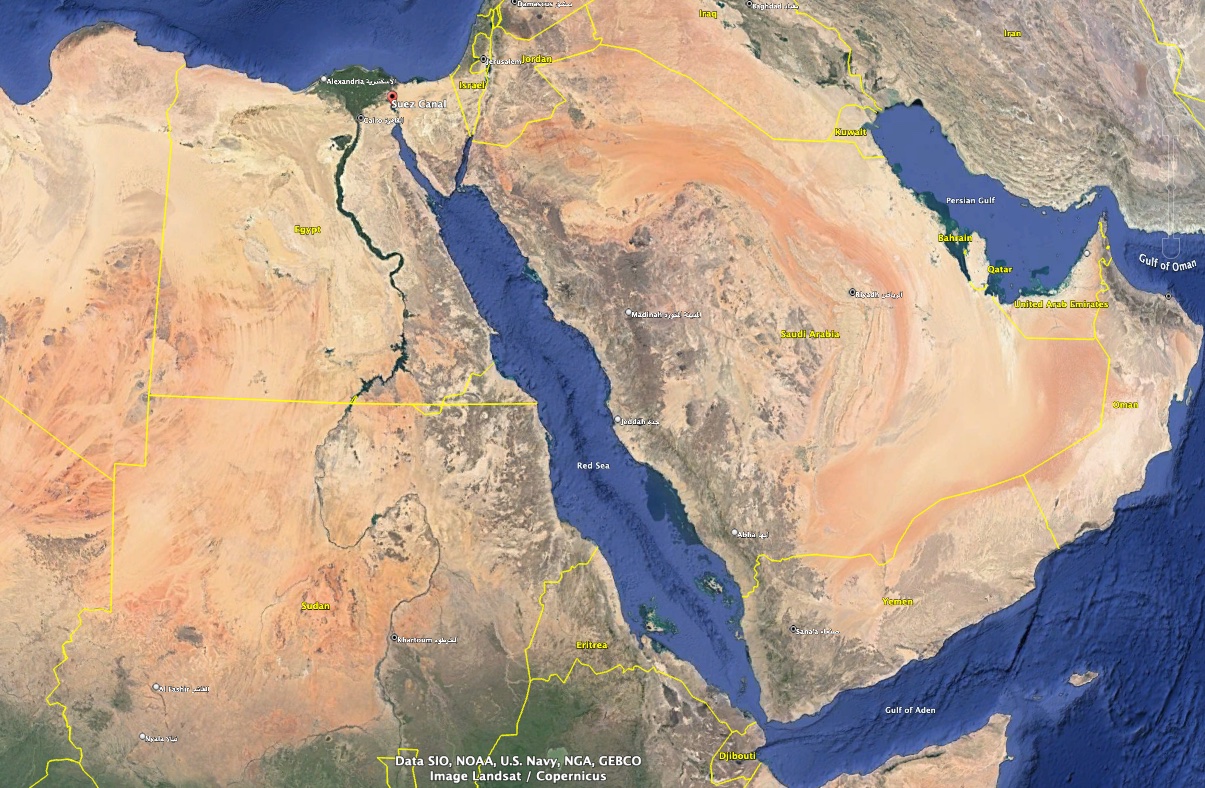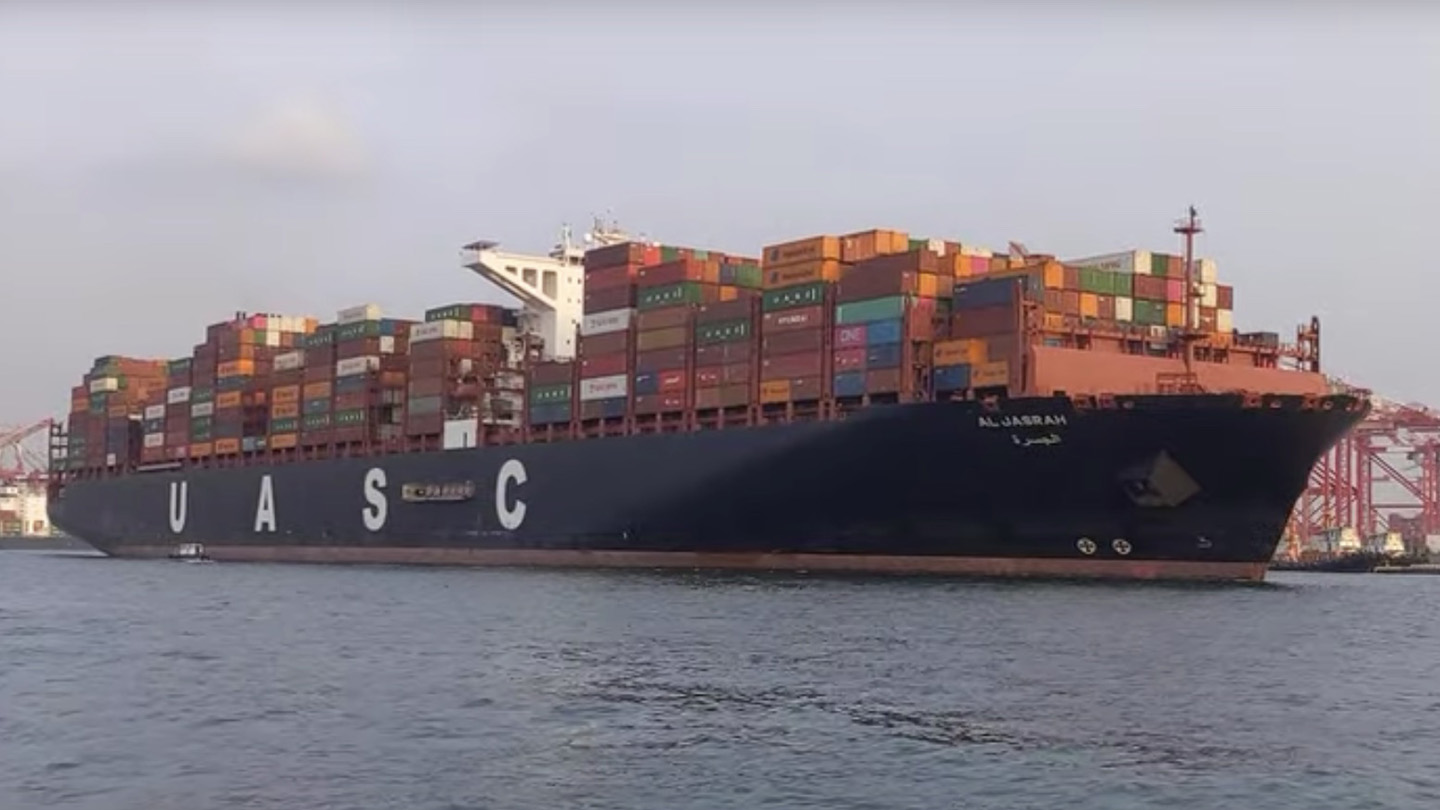Two of the world’s largest shipping companies have decided to pause transits into the Red Sea after the Iranian-backed Houthi rebels stepped up vessel attacks this week, including setting two more ships ablaze today.
Both the Danish Maersk and German Hapag-Lloyd shippers placed temporary bans on their ships passing through the narrow Bab al-Mandab Strait at the southern end of the Red Sea, which has become an increasingly dangerous chokepoint.

As a result of today’s attacks and the near-miss yesterday on the Maersk Gibraltar, the Danish Maersk shipping company told us today that it is instructing all its ships scheduled to pass through the Bab al-Mandab to “pause their journey until further notice.”
“We are deeply concerned about the highly escalated security situation in the southern Red Sea and Gulf of Aden,” the company said in a statement to The War Zone. “The recent attacks on commercial vessels in the area are alarming and pose a significant threat to the safety and security of seafarers.”
The German Hapag-Lloyd company, which controls about 7% of the global container ship fleet, told CNBC in an email, that it will “pause all container ship traffic through the Red Sea until Monday. Then we will decide for the period thereafter.”
The moves come after two more cargo ships were attacked by the Houthis in the Red Sea Friday while a third was threatened, a U.S. military official told The War Zone.
The Liberian-flagged Al Jasrah was struck by a Houthi drone at around 9 a.m. near the Bab al-Mandab Strait, said the official, speaking on on condition of anonymity to talk about operational details. The strike sparked a fire that was eventually extinguished, said the official, adding that there were no injuries reported and the vessel went on its way. It was bound for Jeddah, Saudi Arabia, according to ship tracking sites.
According to the Royal Navy’s United Kingdom Maritime Trade Operations (UKMTO), the first attack today happened about 60 miles southwest of Hodieh, Yemen.
A second cargo ship, the Liberian-flagged MSC Palatium III, was fired upon by two Houthi ballistic missiles, said the official. One missed, but one struck the ship, causing a fire that was also extinguished. That incident took place about 30 nautical miles southwest of Mokha, Yemen, according to UKMTO.
The Arleigh Burke class guided-missile destroyer USS Mason responded to the MSC Palatium III, but was not needed and returned to patrol, the official told us. It did not engage the Houthi weapons this time, but has on four previous occasions since the start of the Israel-Hamas war.
The U.S. military official told us that the Houthis also threatened the Liberian-flagged MSC Alayna but did not attack it after ordering it to head south. UKMTO did not report on that vessel. U.S. Central Command later said that after the Houthis threatened the MSC Alayna, U.S. forces maintained direct communications with the vessel, which headed north. It is believed to be traveling safely at this time.
It is unclear at the moment what, if any connections the three vessels had to Israel.
Houthi spokesman Yahya Sare’e on Friday took responsibility for attacking two ships – the MSC Palatium III and the MSC Alanya – with “suitable naval missiles.”
“The two ships were targeted after their crews rejected to respond to calls from Yemeni naval forces as well as scorching warning signals,” Sare’e said on Twitter. “Yemeni armed forces reassure all ships heading to all ports across the world, except for those that are heading to Israeli ports, that they would be safe and must keep the identifying device open. The Yemeni armed forces will not hesitate to target any ship that violates what was stated in its previous statements. The Yemeni Armed forces vowed to continue to prevent the navigation of vessels heading to Israel until enough food and medicine that our steadfast brothers are in need of in Gaza are allowed into the Strip.”
These were the fourth and fifth attacks this week, escalating Houthi missile and drone strikes against commercial shipping in the Red Sea. They come as U.S. officials are discussing expanding the existing Task Force 153. That’s an international effort focusing “on international maritime security and capacity building efforts in the Red Sea, Bab al-Mandeb and Gulf of Aden.”
The official told us that an announcement on that is expected early next week, when Defense Secretary Lloyd Austin visits Israel, Qatar and Bahrain. He will also visit the aircraft carrier Gerald. R Ford, which arrived in the eastern Mediterranean Sea in October. It was just announced that the carrier’s deployment has been extended into the near year.
In Bahrain, Austin is expected to visit U.S. Naval Forces Central Command. Part of the discussions there between the U.S. and Bahrain will involve U.S. efforts to convene multilateral coalitions to respond to aggression at sea that threatens shipping and the global economy.
“We will talk with them in a multinational framework about the work we’re doing, particularly in light of increasing Houthi aggression in the Red Sea,” a senior official said, according to the Pentagon.
The ongoing Houthi attacks and resulting moves by shipping companies to halt transit into the Red Sea will sting Egypt’s economy, as well.
Cairo receives a great sum of money from ships passing through the Suez Canal from the Red Sea to the Mediterranean Sea.
In its last fiscal year, which ended June 30, Egypt’s Suez Canal Authority saw revenues reach a record $9.4 billion, up from $7 billion in the previous year, Chairman Osama Rabea said at the time.
The chairman added that 25,887 ships passed through the canal by that time, an increase of more than 2,000 ships from the previous year.

These attacks have a cascading effect on the world economy as well.
The International Chamber of Shipping (ICS) told us that “some companies have already rerouted around the Cape of Good Hope to avoid Houthi aggression which adds cost and delay to global trade. Industry is extremely concerned about these attacks on shipping and is understood to be considering additional actions which could lead to further ships diverting to this route, with further potential impacts on trade. The Red Sea is a crucial waterway, linking Europe and Asia. Currently 12% of global trade passes through the Red Sea.”
The trade organization on Friday called for increased action to stop the Houthis.
“These attacks are a flagrant breach of international law,” it said. “States with influence in the region should, as a matter of urgency, work to stop the actions of the Houthis in attacking seafarers and merchant ships, and de-escalate what is now an extremely serious threat to international trade.”
That message amplifies what Maersk told us yesterday after the Maersk Gibraltar narrowly missed being hit by a Houthi missile.
“The recent attacks on commercial vessels in the Bab al-Mandab Strait are extremely concerning,” Mikkel Linnet said in a message to The War Zone. “The current situation puts seafarer lives at risk and is unsustainable for global trade. As it cannot be solved by the global shipping industry on its own, we call on political action to ensure a swift de-escalation.”
So far, the U.S. has refrained from attacking the Houthis as it did in 2016. Whether the anticipated addition to Task Force 153 will make a difference, once it is finally announced, remains to be seen.
Contact the author: howard@thewarzone.com
